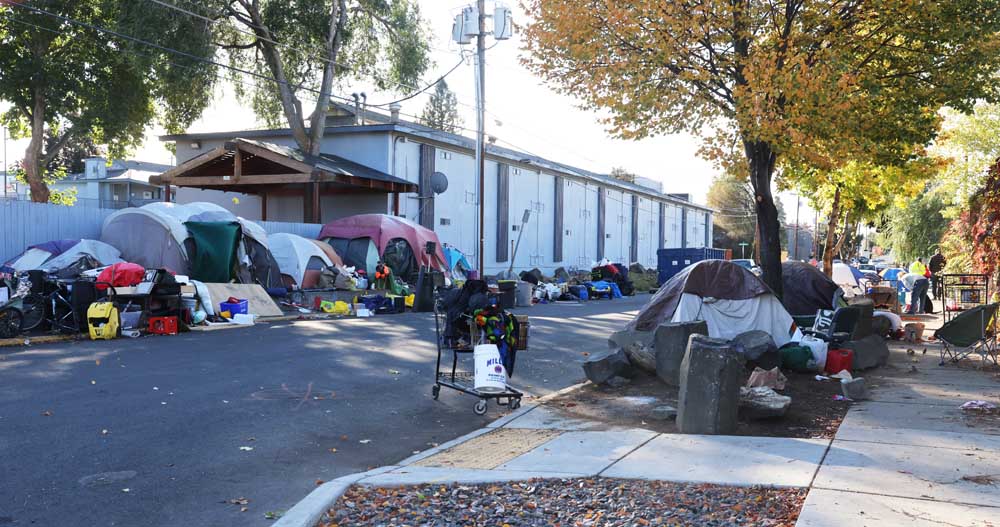New changes to Bend’s proposed homelessness code try to balance concerns, demands
Published 6:00 pm Tuesday, November 1, 2022

- The city of Bend began to remove homeless camps on Second Street in Bend on Oct. 25.
New changes to a set of proposed city codes that would govern when, where and how people can camp in Bend will be discussed by the City Council on Wednesday.
Depending on how the discussion pans out, the council could potentially put the changes to a final vote in December.
The city’s new changes to the code already prompted lengthy conversations among councilors and local service providers at a meeting Thursday.
The proposed code changes have been the subject of public discussion for months.
In September, the city received feedback that the first draft was too stringent, especially where it addressed how long people can camp in one place.
The code changes seek to regulate how people experiencing homelessness can camp on city property if no shelter is available.
In the first version of the code changes, people sheltering on city property would only be allowed to camp overnight, then be required to move. The new draft would allow people to stay in one place for 24 hours, then they would have an additional 72 hours to move elsewhere.
“If these codes are being enforced and someone is going to continually have to pack up every day if it’s a 24 hour notice, it doesn’t allow for any stability for somebody to really establish care, find employment and things like that,” said Colleen Thomas, the homeless services coordinator for Deschutes County Behavioral Health.
Extending the amount of time they can initially stay in one place from 24 hours to 48 hours, or even 72 hours, would take people out of “crisis mode,” Thomas said. More time allows people to make appointments and reach out to their service providers, she said. Thomas said she worries about people being pushed outside of city limits where they could be harder to reach.
Having a time requirement helps to create consistent enforcement, Bend Police Chief Mike Krantz said at Thursday’s meeting. He said people’s accumulation of belongings causes the most impact to the community, and allowing people to stay in one place longer allows them to create more clutter.
The City Council was split 3-3 on how to proceed at Thursday’s meeting, with one member absent. Councilors Anthony Broadman, Melanie Kebler and Megan Perkins were in favor of keeping the 24-hour requirement while Mayor Gena Goodman-Campbell and Councilors Barb Campbell and Mo Mitchell were in favor of lengthening the time allowed to camp before a notice of removal.
Kebler said she was satisfied with the 24 hours of allowance because people are given an additional 72 hours to move.
Cheyenne Purrington, the head of the new coordinated homelessness response office for Deschutes County and its cities, said at Thursday’s meeting that giving people even a little more time to find shelter and access services would be helpful.
But she also said the proposed code isn’t meant to solve problems. As a response, her office is creating a pilot program to implement comprehensive housing-focused and trauma-informed efforts into encampment settings throughout Deschutes County.
“The program is modeled after emergency response efforts and hopes to prevent the use of so-called sweeps, which destabilize already vulnerable neighbors,” Purrington said in a text message.
One of the goals of the code changes is to prevent forced removals, or sweeps, whenever possible, City Attorney Ian Leitheiser said.
The new draft of the code specifies the city’s “intent to resolve violations at the lowest level possible and seek compliance while maintaining dignity of all involved,” a memo from the city attorney’s office reads. A requirement was added to the code that those found to be in violation should be referred to services and given the opportunity to abide by the city’s rules before being given a citation.
“The goal of a code is to set those expectations in a way that people can follow, rather than letting things stay how they are until they get to the point of being unsafe,” Leitheiser said in an email.
The hope is that the proposed code results in fewer sweeps, but there may be some situations where they may be unavoidable, Leitheiser said.
At Wednesday’s meeting, the council and staff are expected to begin the next leg of the city’s camping code process. At the Nov. 16 council meeting, members of the public will be able to offer input on the new draft.
If the council sticks to this schedule, councilors could vote on the code in December before newly elected councilors take over.
As of Monday, The Lighthouse Navigation Center at 274 NE Second St. is Bend’s sole cold-weather shelter open to men, women and families, according to the Homeless Leadership Coalition.








